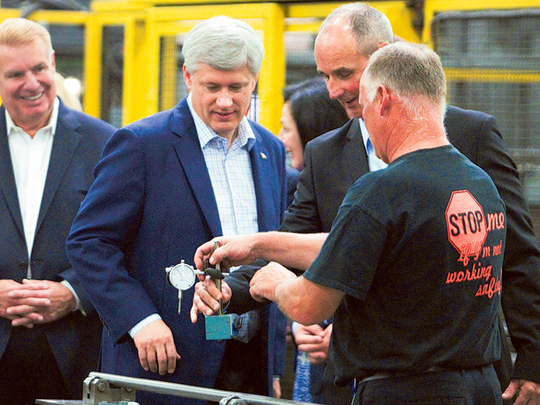
Toronto: Canada has fallen into a recession, dragged down by falling energy prices and economic troubles in China.
The Canadian economy retreated at an annual pace of 0.5 per cent from April through June after sliding 0.8 per cent the first three months of the year, Statistics Canada reported Tuesday. Two consecutive negative quarters are the technical definition of a recession.
Canada is the world’s 11th-biggest economy and the United States’ biggest trading partner. The Canadian economy suffered far less damage from the financial crisis and Great Recession than its southern neighbor.
The economic news could spell trouble for Prime Minister Stephen Harper during the October 19 election. Analysts call the three-way race a toss-up. Harper, campaigning for a fourth term on a record of economic growth, refused Tuesday to recognise that Canada is in a recession.
But the data shows that business investment and commercial construction fell sharply in Canada, reflecting cutbacks by energy companies responding to lower oil prices.
Economists, however, expressed confidence the Canadian economy will rebound. Mark Zandi, chief economist at Moody’s Analytics, said the Canadian slowdown can be at least partially traced to the problems in China and said the weakness is largely confined to energy sector: “The rest of the Canadian economy is doing OK.”
Moreover, the economy grew at 0.5 per cent pace in June, first monthly gain in six months. “The economy is contracting through the first half of the year, but the solid gain in June suggests that we’ll at least get a breather with a return to growth in the third quarter,” said CIBC chief economist Avery Shenfeld.
Harper said the economy was bouncing back after a brief bump. He pointed to 0.5 per cent growth in June.
“I think it’s more important to describe the reality of the situation rather than to have labels,” Harper said.
Harper called Canada an “island of stability” amid rough financial waters. The country avoided the worst of the 2008 global financial crash and fared better than most nations. Unlike the US, it avoided a real estate market implosion or credit crisis.
That was before oil prices plunged, dragging down Canada’s economy. Now Harper’s bid to become the first Canadian leader to win four consecutive terms in over a century is far from assured. Harper reminded Canadians of their recent prosperity Tuesday. The Conservatives have run small deficits and are promising balanced budgets.
“We’ve had a couple of weak months, but the fact of the matter is over the long haul, post the global financial crisis, Canadians know there is no better place to be,” Harper said.
Since coming to power in 2006, Harper has managed to pull a traditionally centre-left country to the right. He has lowered taxes and supported the oil industry, but has failed to win approval for new pipelines that would get the oil to market.
Analysts say the left-of-centre opposition New Democrats, led by Tom Mulcair, has a chance to gain power for the first time. Mulcair has moved his party to the centre and vowed to balance the budget.
The opposition Liberals, who governed Canada for most of last century, said they would stimulate the economy with deficit spending on infrastructure.
Opposition Liberal leader Justin Trudeau, the 43-year-old son of late Prime Minister Pierre Trudeau, said Harper refused to acknowledge the economy was in trouble and his plan was failing.
“Today it has been officially recognised what Canadians have known for a long time, that there is a need for investment,” Trudeau said.
Mulcair said Harper just won’t acknowledge that his plan his failing. “All the objective measures prove that Stephen Harper’s plan has failed,” Mulcair said.












